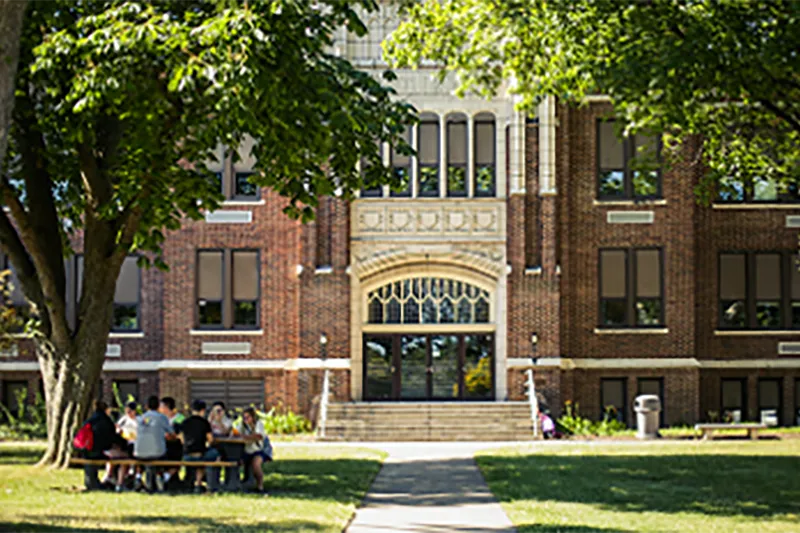Summary
There is no way to avoid bereavement (loss). If we love or value anyone or anything and have lost him/her/it due to death or other circumstances, we grieve. Therefore, we are all survivors of loss! Every single one of us is a survivor of loss. It does not matter who or what was lost or how the loss occurred. All loss is loss and all loss elicits grief. How we react to loss is grief. How we integrate that loss into our life, move forward, “create a new normal,” is mourning. Many have found the narrative approach to mourning highly effective.
The Phrase Came from Deb Banks
In April of 2005, I invited Jeff and Deb Banks plus three others to UToledo to appear on a panel discussion that I hosted for students in my death and dying classes. Jeff and Deb and three others had recently experienced a tremendous loss (i.e., bereavement). A college-age child (sister and girlfriend) had died suddenly and unexpectedly on a spring break trip. Each one of them responded to their losses very differently.
Toward the end of the panel discussion in 2005, I asked each member of our expert panel for advice about how to cope with tremendous loss. Deb Banks, mother of Jason Banks, who had died tragically on a trip to Myrtle Beach, SC, said this: “You cannot go around it or under it. You must climb that mountain and it’s awful.” Thus, the title of this blog post.
Twenty years later on January 2, 2023, for Episode #5 of the podcast sponsored by the 1795 Group (i.e., Grass Roots Health), I reconnected with Jeff and Deb and asked them the same question. Guess what she said this time. You will have to listen to the podcast to find out.
Bereavement
As you might surmise, Jeff and Deb are both very wise and have learned a lot from their experience with loss (i.e., bereavement). There is no way to avoid bereavement and each of us must climb the mountain of grief. To be human is to experience some form of loss. All of us are survivors of bereavement. Thus, all of us have been bereft.
So, what is “bereavement” exactly? Bereavement is the objective event of loss, the story of our loss. Someone or something that we loved and valued was taken away from us against our wishes. Every single person that is reading this blog has experienced a loss. Some common examples of losses are the death of a person, the death of a pet, the loss of employment, retirement, the loss of a relationship, a marriage, the past, a past role, our youth, safety and security, our reputation, our health, a past home, or the loss of possessions due to theft or natural disaster. It does not matter who or what was lost or how it was lost. Remember, that all loss is loss and that all loss elicits grief.
Grief
While bereavement is the story of our loss, grief is our reaction to it. Grief reactions occur in many parts of our existence: physical, mental, emotional, behavioral, and spiritual. Grief can manifest itself in many ways. For example, I remember in April of 2005 that our guests said things such as: When they received the bad news about their child, sister, or girlfriend being dead, their legs gave out, they fell to the floor, they felt like an elephant was sitting on their chest, they were in in total disbelief, in denial, confused, they were angry, they cried, and lost interest in things that they were currently doing. Some even tried to fool themselves into thinking that what they were experiencing was a bad dream and that once they woke up the next morning, that everything would be back to “normal.”
Heavy grief typically sets in weeks or months after the early stage of grief – after the funeral, cremation, or burial phase. Once all the relatives go home, people stop calling, and the sympathy cards stop arriving, things at home are just not the same. There is an empty chair at the dinner table that was formerly occupied by the decedent. That bed where they slept is now cold. That person is no longer there to talk to or care for.
This is why I have always recommended that this time of grief (i.e., the middle phase) is the best time to mail the note, card, letter, send the flowers, send that email or text, stop by with their favorite food, or stop by to help rake leaves etc. It is during this middle phase that the reality of the loss is realized.
It is during this middle stage of grief or later that the survivor realizes that he/she must “create a new normal” without that person, pet, or thing. Who or what was lost is not coming back.
Some survivors can move forward with the help of family and friends. Others may need the help of a spiritual expert, a grief group, or a professional grief counselor. 3 One thing is certain: No one can move forward alone.
Mourning
While bereavement is one’s story of loss and grief is one’s reaction to it, mourning is the process of integrating the loss into one’s ongoing life. Grief and mourning are NOT the same. Do not think of or use the two terms interchangeably. They are very different processes.
Mourning is the process of “creating a new normal” without that person, pet, or thing. We never forget that person who is now dead, but we relate to them in a very different way. We still think about them often and may even talk to them.
You see, all loss requires change and typically, all change involves some type of loss. You and I both know that change is very difficult for humans, especially if the person that died was in our lives for many years and our identity was intertwined with him/her (e.g., parent, spouse, sibling).
The Narrative Approach to Mourning
About two years into my career as a university professor (around 2003), I discovered the narrative approach to mourning (Kelly, 1955; Neimeyer & Mahoney, 1995; and Neimeyer & Stewart, 1996). This approach has helped me and many others cope with loss in a healthy way. The narrative approach involves telling our stories of loss and talking about who or what we lost.
When you think about it, our lives are a tapestry of stories. Humans are “hard wired” to tell and listen to stories. Don’t believe me? Just attend a lecture in school or in the community or go to church and watch people during the sermon. What happens when the teacher, speaker, or religious expert tells a personal story? The heads pop up and people listen!
Or, just listen to some long-time friends talk who have not seen one another for a long time. What do they talk about? You guessed it. They tell stories.
Stories help us make sense of the world. Stories help us make sense of our past. Therefore, we like stories and remember them. That’s why I have always collected many stories and taught using a story-telling technique.
My Part of the Story

Here is part of my story. The home in the accompanying picture is where I grew up in Rossford Ohio from age 9 or 10 until I got married and moved out. We moved into this much larger home from a small, white frame house across town after my 3rd grade year.
My bedroom was just behind that big picture window on the left side of the house. The house featured only one bathroom and no basement. This home and the memories of my family living in it for years are very important to me.
Around the perimeter of our front yard was a low hedge row made up of bushes with thorns in them.
Trimming these bushes and raking up the debris (with gloves of course) became one of my chores from age 11 or so. I also started cutting the grass with the Craftsman self-propelled lawn mower.
My dad taught me how to use his electric hedge trimmers and how to make the hedge row bushes look nice. I still use these lessons today on my own bushes. That’s why using his hedge trimmers in the late summer of 2017 after he died was a tremendous grief trigger for me. You will hear about this in Episode # 5 of Grass Roots Health.
I was also a very good baseball player at Rossford High School. My name is still prominently displayed in the record books nearly 50 years later. I practiced a lot and worked very hard to be good. As an example, if you look closely at those black shutters along the left side of the large window out front of my former home, you can probably see a few dents in them from the rubber baseball that I threw to myself for hours on end for years.
My poor parents! I am sure that they heard the “thud,” “thud,” “thud” of my rubber ball hitting that brick for years and saw the dents in their shutters. However, to their credit, they never told me to stop.
As a result of constantly throwing and fielding that rubber baseball (and my dad’s excellent coaching), I became one of the best left-handed pitchers and one of the best fielding first baseman in Rossford High School history.

This is Rossford High School, where I went to school from grades 9-12. Those steps in front of the school are the “senior steps.” Younger students who were not seniors were NOT allowed to use those steps. If they did, they faced the wrath of the senior class and were probably given a “swirly” and a “wedgie” against their will. As a result, very few younger students ever “tried us.” By the way, if you do not know what “swirly” or “wedgy” is, look it up on Google
Every Loss Requires a New Story
I no longer play baseball nor attend Rossford High School. That part of my life has been lost. The loss of those highly valued parts of my life caused me to create a new story. You see, every loss that we experience creates new story for us or a new set of stories.
For example, the more recent loss of music from my life due to Meniere’s Disease has been a very significant loss for me. I now wear bilateral hearing aids and cannot hear well enough to perform musically. For many years, much of my identity was wrapped around the concept of being a good musician, a good songwriter, keyboard player, vocalist, and a worship leader. Meniere’s Disease took that away against my will. Not only did I lose music in my life but I also lost a big part of myself.
That loss created the need for me to reform and revise my story. My life story has changed. That loss hurt deeply and I continue to mourn as I try to create a “new normal” without music. The deaths of significant others in my life also created a new loss story: my grandparents, all of my aunts and uncles except one, two of my cousins, my father-in-law, my dad, my mother-in-law, seven of my high school classmates, and three former students. All of these important people to me are now gone. Their deaths caused me to re-write my story. You see, when we lose someone or something we must revise, re-form, and tell a new life story.
Telling our story of loss helps us to integrate the loss (and the decedent) into our lives in a new way. Telling the story or our loss help us adjust our relationships in ways that help to restore wholeness. It helps give our grief a voice and helps us view the loss from a distance. Telling our story of loss helps us keep the deceased loved one in our lives and helps us create that “new normal” without leaving the decedent behind. All of these things are good!
Early On, All We See, Think About, and Talk About is The Loss
When we first experience a loss, it is there in front us at all times. The loss is all that we see with both eyes, every minute of every day and even during sleep. No matter which way we turn, the loss is there in front of us. We eat, drink, and sleep our loss. That’s all we think about, talk about, and post on social media about. It’s natural to do so but eventually we must move beyond that.

Eventually, the more we talk about the loss to others, we start to see life out of one eye. We start to do some of the things that once interested us. We return to school or to work. We start to see other people. We start to care about other things besides the loss.
We never forget who or what was lost! However, telling our story of loss helps us find a different place for it. When once it occupied front and center of our minds, it eventually moves to the periphery of our vision.
Periodically, “grief triggers” such as seeing one of his/her old friends, using something that reminds us of him/her, seeing someone that reminds us of him/her, scents, cologne, perfume, songs, holidays, birthdays, wedding anniversaries, photographs, and social media postings may cause the loss to once again be front and center . . . and cause us to grieve again. That is very normal and natural. Again, to grieve is to be human.
Jeff Banks Discovered the Benefits of the Narrative Approach
As you will hear in Episode # 5 of the Grass Roots Health podcast, Jeff Banks discovered the benefits of the narrative approach. In fact, in April of 2005 when he and I first met during the panel discussion with his wife Deb and three others, I asked Jeff if he had any advice for the college students in the room and for the thousands that would be watching and listening to the video of the panel. Guess what he said? He said this: “You have to find someone that you trust and you must talk to them about your loss. If you do not, the grief will come back and ‘bite you.’
When I recently had Jeff and Deb on the podcast, I asked him the same question 20 years after the death of his son, Jason. Guess what he said? Did his advice change? If you are interested in the answer to this question, you will have to listen to this episode (Episode # 5).
The 1795 Group Can Help
Perhaps you would like a guest speaker on death and dying or end-of-life topics. Perhaps you would like a guest lecturer for a group of medical students, medical residents, a class of pre-med, nursing, respiratory therapy, or other student learners who will one day be working with patients and their families. Perhaps you would like to have your students, learners, or employees enjoy the benefits of professional development workshop or continuing education in this area. Whatever your need in death and dying/end-of-life, the 1795 Group can help.
References
Kelly, G. A. (1955). The psychology of personal constructs. New York: Norton.
Neimeyer, R. A., & Mahoney, M. J. (1995). Constructivism in psychotherapy. Washington, DC: American Psychological Association.
Neimeyer, R. A., & Stewart, A. E. (1996). Trauma, healing, and the narrative employment of loss. Families in Society, 77, 360–375.


